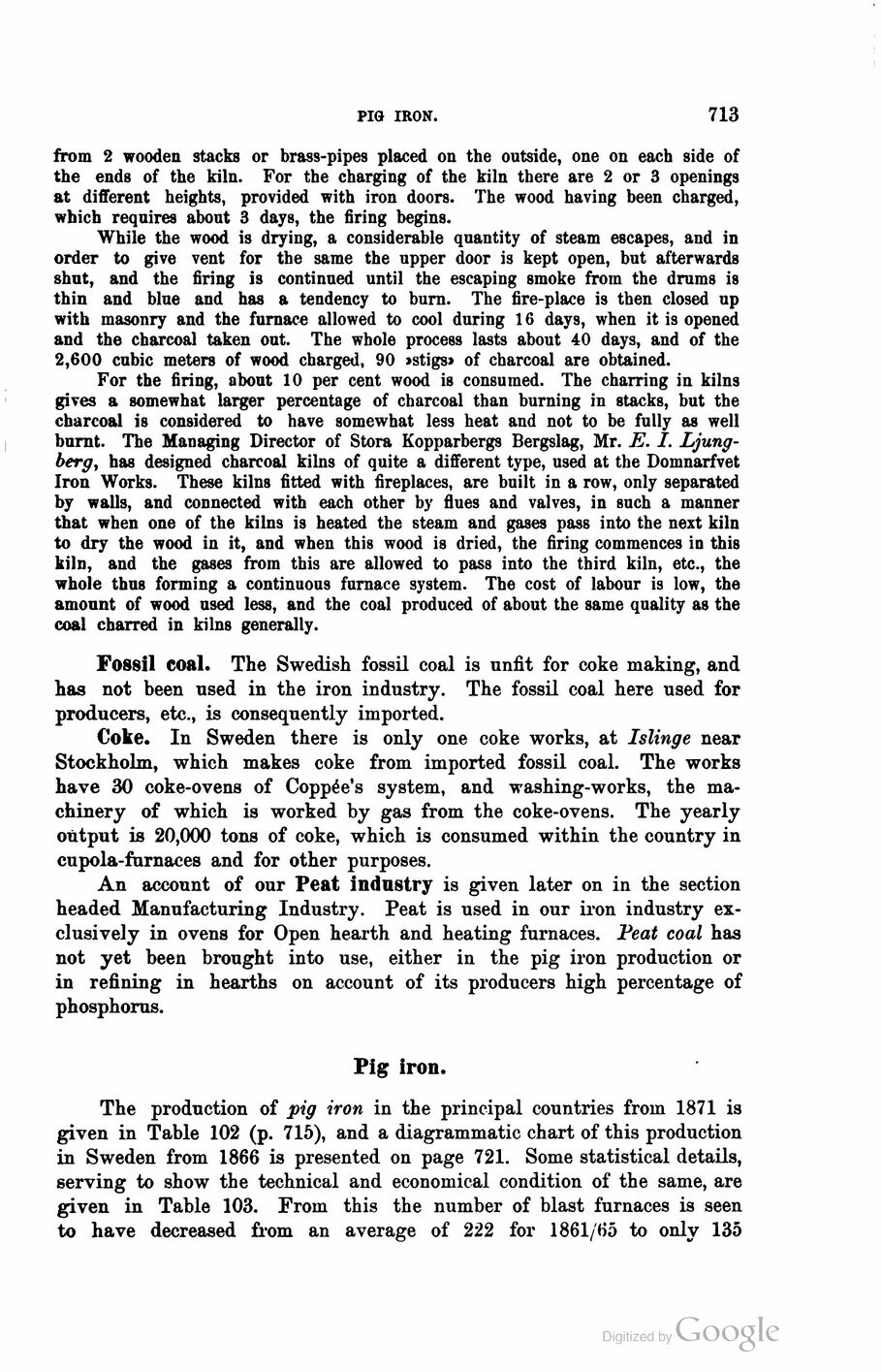
Full resolution (JPEG) - On this page / på denna sida - Second part - IX. Mining Industry and Metal Production - 2. The Iron and Steel Industry. By the late Prof. J. G. Wiborgh - Fuel - Pig iron

<< prev. page << föreg. sida << >> nästa sida >> next page >>
Below is the raw OCR text
from the above scanned image.
Do you see an error? Proofread the page now!
Här nedan syns maskintolkade texten från faksimilbilden ovan.
Ser du något fel? Korrekturläs sidan nu!
This page has never been proofread. / Denna sida har aldrig korrekturlästs.
wrought IRON.
713
from 2 wooden stacks or brass-pipes placed on the outside, one on each side of
the ends of the kiln. For the charging of the kiln there are 2 or 3 openings
at different heights, provided with iron doors. The wood having been charged,
which requires about 3 days, the firing begins.
While the wood is drying, a considerable quantity of steam escapes, and in
order to give vent for the same the upper door is kept open, but afterwards
shut, and the firing is continued until the escaping smoke from the drums is
thin and blue and has a tendency to burn. The fire-place is then closed up
with masonry and the furnace allowed to cool during 16 days, when it is opened
and the charcoal taken out. The whole process lasts about 40 days, and of the
2,600 cubic meters of wood charged, 90 »stigs» of charcoal are obtained.
For the firing, about 10 per cent wood is consumed. The charring in kilns
gives a somewhat larger percentage of charcoal than burning in stacks, but the
charcoal is considered to have somewhat less heat and not to be fully as well
burnt. The Managing Director of Stora Kopparbergs Bergslag, Mr. E. I.
Ljungberg, has designed charcoal kilns of quite a different type, used at the Domnarfvet
Iron Works. These kilns fitted with fireplaces, are built in a row, only separated
by walls, and connected with each other by flues and valves, in such a manner
that when one of the kilns is heated the steam and gases pass into the next kiln
to dry the wood in it, and when this wood is dried, the firing commences in this
kiln, and the gases from this are allowed to pass into the third kiln, etc., the
whole thus forming a continuous furnace system. The cost of labour is low, the
amount of wood used less, and the coal produced of about the same quality as the
coal charred in kilns generally.
Fossil coal. The Swedish fossil coal is unfit for coke making, and
has not been used in the iron industry. The fossil coal here used for
producers, etc., is consequently imported.
Coke. In Sweden there is only one coke works, at Islinge near
Stockholm, which makes coke from imported fossil coal. The works
have 30 coke-ovens of Coppée’s system, and washing-works, the
machinery of which is worked by gas from the coke-ovens. The yearly
output is 20,000 tons of coke, which is consumed within the country in
cupola-furnaces and for other purposes.
An account of our Peat industry is given later on in the section
headed Manufacturing Industry. Peat is used in our iron industry
exclusively in ovens for Open hearth and heating furnaces. Feat coal has
not yet been brought into use, either in the pig iron production or
in refining in hearths on account of its producers high percentage of
phosphorus.
Pig iron.
The production of pig iron in the principal countries from 1871 is
given in Table 102 (p. 715), and a diagrammatic chart of this production
in Sweden from 1866 is presented on page 721. Some statistical details,
serving to show the technical and economical condition of the same, are
given in Table 103. From this the number of blast furnaces is seen
to have decreased from an average of 222 for 1861/65 to only 135
<< prev. page << föreg. sida << >> nästa sida >> next page >>